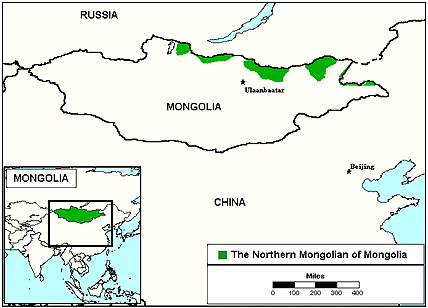|
|
Prayer Profile
The Northern Mongolian of Mongolia
![[IMAGE]](../images3/0457.jpg) The Northern Mongolian, also known as the Buryat, are believed to be the descendants of the western Mongols and the northern Siberians. Of the 560,000 Northern Mongolian, only 60,000 live in Mongolia. There, they primarily inhabit the forested lowland regions along the Russia-Mongolia border.
The Northern Mongolian, also known as the Buryat, are believed to be the descendants of the western Mongols and the northern Siberians. Of the 560,000 Northern Mongolian, only 60,000 live in Mongolia. There, they primarily inhabit the forested lowland regions along the Russia-Mongolia border.
The territory that once belonged to the Northern Mongolian's ancestors includes the regions along Lake Baikal, which is located in present-day Siberia. About 75% of all the Northern Mongolian still live there, in a region that is now known as the Buriat Autonomous Republic.
The Northern Mongolian are very similar to the Khalkha Mongols, particularly in their physical features, dialects, and customs. In fact, they are often indistinguishable from neighboring Mongol tribes. However, they maintain a number of small differences, the most significant of which is their language.
What Are Their Lives Like?
Traditionally, the Northern Mongolian were nomadic shepherds who raised horses, cattle, sheep, goats, and a few camels. Today, many still raise horses and sheep. Others have jobs in wood-related industries or coal mines; some trap animals; and many work on the "collective" (community) farms.
A number of the Northern Mongolian sill live as semi-nomadic herdsmen, migrating seasonally with their animals. Their dwellings are portable gers or yurts, which are round felt tents that have brightly painted wooden doors. The urban Northern Mongolian live in Soviet-built apartment complexes.
Due to the harshness of the climate in Mongolia, the people consume much fat and meat (mainly mutton) during the winter, and dairy products such as yogurt, cheese, and sour cream during the summer. Their favorite drink is airag, which is fermented mare's milk.
In their traditional social organization, the Northern Mongolian were separated into nobility, commoners, and slaves. Their society was based on the clan (extended family) or lineage. A man's home, political position, inheritance, and status were all determined by his clan membership. Formerly, marriages were arranged by the parents; whereas, today, most marriages are initiated by the couples themselves. Sadly, the divorce rate has increased in recent years.
The Northern Mongolian love music, folk dances, chess, and sporting events. Every July, the ancient Naadam festival is celebrated throughout Mongolia. Sporting events are held in horse racing, archery, and wrestling.
Buriat, the native language of the Northern Mongolian, is not yet a written language. However, all Northern Mongolian also speak the national language, Halh Mongolian. Halh is used as their literary language.
What Are Their Beliefs?
The Northern Mongolian were traditionally shamanists (believed in an unseen world of gods, demons, and spirits). They viewed the spirit world as a "reflection" of the natural world. They believed that when someone died he would pass over into the spirit world and assume his proper role as either a good or evil spirit. Evil men were thought to become devils, while great men became gods. The people depended on shamans (medicine men) to cure the sick by magic, communicate with the gods, and control events.
Most Mongolians have practiced Tibetan Buddhism since the late 1500's. By 1900, Mongolia was the most "religious" nation on earth, with 60% of its males serving as priests in Buddhist monasteries. Today, about half of the Northern Mongolian are atheists. Many others have returned to the Buddhist beliefs of their forefathers.
What Are Their Needs?
Rape, murder, alcoholism, and violence are major problems in Mongolia's urban areas today. Many young people are also involved in criminal gangs. The Northern Mongolian need to find true peace—peace that can only come through knowing Jesus Christ.
Prayer Points
- Pray that the doors of Mongolia will soon open to Christian missionaries.
- Ask the Lord of the harvest to send forth many laborers into Mongolia to share the Good News.
- Pray that God will reveal Himself to the Northern Mongolian through dreams and visions.
- Take authority over the spiritual principalities and powers that are keeping the Northern Mongolian bound.
- Pray against the spirits of alcoholism, violence, and divorce that are destroying the lives of the Mongolians.
- Ask God to raise up teams of intercessors who will faithfully stand in the gap for the Northern Mongolian.
- Pray that Christians will have opportunities to introduce the Northern Mongolian to the Prince of Peace.
- Pray that God will open the hearts of Mongolia's governmental leaders to the Gospel.

See also the following Groups:
The Buryat of China;
The Khalkha Mongol of Mongolia; and
The Khalkha Mongol of China.
Statistics
Latest estimates from the World Evangelization Research Center.
THE PEOPLE
- People name: Northern Mongolian
- Country: Mongolia
- Their language: Buryat
- Population:
- Largest religion:
- Christians: 1%
- Church members: 600
- Scriptures in their own language: Portions
- Jesus Film in their own language: Available
- Christian broadcasts in their own language: Available
- Mission agencies working among this people: 2
- Persons who have heard the Gospel: 18,000 (30%)
- Persons who have never heard the Gospel: 42,000 (70%)
THEIR COUNTRY
- Country: Mongolia
- Population:
- Major peoples in size order:
- Major religions:
- Number of denominations: 6
© Copyright 1997
Bethany World Prayer Center
This profile may be copied and distributed without obtaining permission
as long as it is not altered, bound, published
or used for profit purposes.
![[HOME BUTTON]](../graphics/home.jpg)
![[CALENDAR BUTTON]](../graphics/calico.jpg)
![[LIST BUTTON]](../graphics/listico.jpg)
[Home]
[Calendar]
[Country List]
|